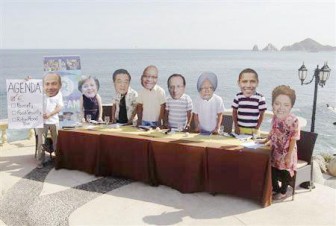LOS CABOS, Mexico (Reuters) – World leaders pressured Europe yesterday to take ambitious new steps to resolve its debt crisis after a victory for pro-bailout parties in a Greek election failed to calm markets or ease worries that wider turmoil could derail the global economy.

The world’s major industrialized and developing economies were set to urge Europe to take “all necessary policy measures” to resolve a crisis that has now raged for over two years, according to a draft communiqué seen by Reuters that was prepared for a Group of 20 summit in this Mexican resort town.
US President Barack Obama, concerned Europe’s woes could upend his re-election hopes, requested a meeting with its leaders last evening.
Earlier he met Germany’s Angela Merkel, who as the leader of Europe’s biggest economy is under intense pressure to explore bold new short-term measures, but has so far resisted. Obama’s spokesman said the US president was encouraged by the talks, which touched on steps to “increase European integration”.
European officials rejected the notion that they were to blame for weakening growth across the globe, and played down hopes for any quick miracle cure for the 17-nation euro zone. “Frankly, we are not coming here to receive lessons in terms of democracy or in terms of how to run our economy,” said European Commission President Jose Manuel Barroso.
Protected by Mexican navy vessels and troops on sun-baked beaches and highways, leaders from the Group of 20 countries representing more than 80 percent of world output began a two-day meeting to prioritize growth and job creation against a backdrop of a weakening global economy.
Rising violence in Syria and the near-collapse of a United Nations-brokered peace plan was also in focus as Obama met Russian President Vladimir Putin. The two super powers have clashed over arming Syria and UN sanctions.
Obama and Putin agreed that the violence in Syria has to end but offered no new solutions and showed no signs of reaching a deal on tougher sanctions against Damascus.
But Europe’s battle against a debt crisis that has led Greece, Ireland and Portugal to seek EU/IMF rescues, and forced Spain to seek aid for its banks, was set to dominate an opening discussion of G20 leaders on the global economy. The World Bank lowered its forecast for global growth in 2012 to 2.5 percent and warned that developing countries faced a long period of financial market volatility and weaker growth.
A narrow victory for the conservative New Democracy party in the Greek election on Sunday eased concerns the heavily indebted country could exit the euro zone soon but did little to calm financial markets.
After an initial relief rally, the euro fell against the dollar and Spanish bond yields hit a new euro-era high above 7 percent. European stocks ended 1.2 percent lower.
Fitch Ratings agency said the Greek result had lowered the risk of a disorderly default and the scenario of a euro zone exit, but it also warned that any new government in Athens was likely to be fragile. “The win in Greece does not really resolve anything,” said Boris Schlossberg, managing director at investment advisory firm BK Asset Management in New York. “It’s still going to be tough for Greece.”




